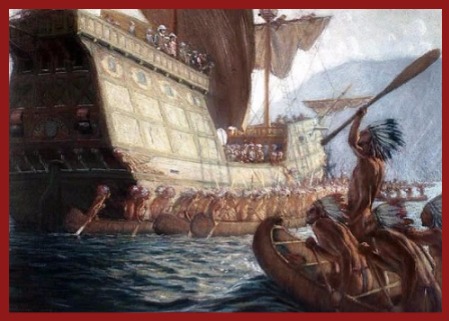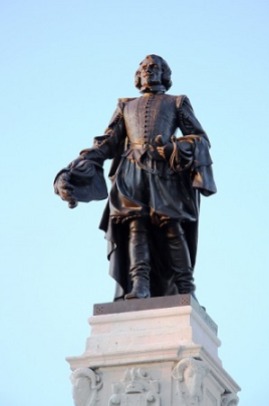This concludes Pioneers of France in the New World by Francis Parkman. The entire book has been presented here. Next book in his series begins next week.

Public domain image from “Wikipedia.
Our special project presenting the definitive account of France in Canada by Francis Parkman, one of America’s greatest historians.
Previously on Parkman
To the vital principle of propagandism both the commercial and the military character were subordinated; or, to speak more justly, trade, policy, and military power leaned on the missions as their main support, the grand instrument of their extension. The missions were to explore the interior; the missions were to win over the savage hordes at once to Heaven and to France. Peaceful, benign, beneficent, were the weapons of this conquest. France aimed to subdue, not by the sword, but by the cross; not to overwhelm and crush the nations she invaded, but to convert, civilize, and embrace them among her children.
And who were the instruments and the promoters of this proselytism, at once so devout and so politic? Who can answer? Who can trace out the crossing and mingling currents of wisdom and folly, ignorance and knowledge, truth and falsehood, weakness and force, the noble and the base, can analyze a systematized contradiction, and follow through its secret wheels, springs, and levers a phenomenon of moral mechanism? Who can define the Jesuits? The story of their missions is marvelous as a tale of chivalry, or legends of the lives of saints. For many years, it was the history of New France and of the wild communities of her desert empire.
Two years passed. The mission of the Hurons was established, and here the indomitable Breheuf, with a band worthy of him, toiled amid miseries and perils as fearful as ever shook the constancy of man; while Champlain at Quebec, in a life uneventful, yet harassing and laborious, was busied in the round of cares which his post involved.
Christmas day, 1635, was a dark day in the annals of New France. In a chamber of the fort, breathless and cold, lay the hardy frame which war, the wilderness, and the sea had buffeted so long in vain. After two months and a half of illness, Champlain, stricken with paralysis, at the age of sixty-eight, was dead. His last cares were for his colony and the succor of its suffering families. Jesuits, officers, soldiers, traders, and the few settlers of Quebec followed his remains to the church; Le Jeune pronounced his eulogy, and the feeble community built a tomb to his honor.

CC BY-SA 3.0 image from Wikipedia.
The colony could ill spare him. For twenty-seven years he had labored hard and ceaselessly for its welfare, sacrificing fortune, repose, and domestic peace to a cause embraced with enthusiasm and pursued with intrepid persistency. His character belonged partly to the past, partly to the present. The preux chevalier, the crusader, the romance-loving explorer, the curious, knowledge-seeking traveler, the practical navigator, all claimed their share in him. His views, though far beyond those of the mean spirits around him, belonged to his age and his creed. He was less statesman than soldier. He leaned to the most direct and boldest policy, and one of his last acts was to petition Richelieu for men and munitions for repressing that standing menace to the colony, the Iroquois. His dauntless courage was matched by an unwearied patience, proved by life-long vexations, and not wholly subdued even by the saintly follies of his wife. He is charged with credulity, from which few of his age were free, and which in all ages has been the foible of earnest and generous natures, too ardent to criticize, and too honorable to doubt the honor of others. Perhaps the heretic might have liked him more if the Jesuit had liked him less. The adventurous explorer of Lake Huron, the bold invader of the Iroquois, befits but indifferently the monastic sobrieties of the fort of Quebec, and his somber environment of priests. Yet Champlain was no formalist, nor was his an empty zeal. A soldier from his youth, in an age of unbridled license, his life had answered to his maxims; and when a generation had passed after his visit to the Hurons, their elders remembered with astonishment the continence of the great French war-chief.
His books mark the man, — all for his theme and his purpose, nothing for himself. Crude in style, full of the superficial errors of carelessness and haste, rarely diffuse, often brief to a fault, they bear on every page the palpable impress of truth.
With the life of the faithful soldier closes the opening period of New France. Heroes of another stamp succeed; and it remains to tell the story of their devoted lives, their faults, follies, and virtues.
– Pioneers of France in the New World by Francis Parkman
| <—Previous | Master List | Next—> |
The below is from Francis Parkman’s Introduction.
If, at times, it may seem that range has been allowed to fancy, it is so in appearance only; since the minutest details of narrative or description rest on authentic documents or on personal observation.
Faithfulness to the truth of history involves far more than a research, however patient and scrupulous, into special facts. Such facts may be detailed with the most minute exactness, and yet the narrative, taken as a whole, may be unmeaning or untrue. The narrator must seek to imbue himself with the life and spirit of the time. He must study events in their bearings near and remote; in the character, habits, and manners of those who took part in them, he must himself be, as it were, a sharer or a spectator of the action he describes.
With respect to that special research which, if inadequate, is still in the most emphatic sense indispensable, it has been the writer’s aim to exhaust the existing material of every subject treated. While it would be folly to claim success in such an attempt, he has reason to hope that, so far at least as relates to the present volume, nothing of much importance has escaped him. With respect to the general preparation just alluded to, he has long been too fond of his theme to neglect any means within his reach of making his conception of it distinct and true.
MORE INFORMATION
TEXT LIBRARY
Here is a Kindle version: Complete Works for just $2.
- Here’s a free download of this book from Gutenberg.
- Biography of Samuel de Champlain.
- Article on New France in North America.
- From the Canada History Project.
MAP LIBRARY
Because of lack of detail in maps as embedded images, we are providing links instead, enabling readers to view them full screen.


Leave a Reply
You must be logged in to post a comment.